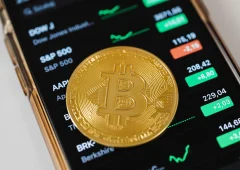GameStop Exploring Bitcoin Investment – Will It Follow MicroStrategy?
13.02.2025 23:52 1 min. read Alexander Stefanov
GameStop is reportedly weighing the possibility of investing in Bitcoin and other cryptocurrencies, sources suggest.
The video game retailer, known for its meme stock status, is said to be exploring alternative assets, with a particular focus on Bitcoin. Following the news, GameStop’s stock surged by as much as 20% in after-hours trading.
While the company has yet to make a final decision, discussions are ongoing about whether such investments align with its business strategy. CEO Ryan Cohen recently fueled speculation by sharing a photo with MicroStrategy co-founder Michael Saylor, though sources indicate Saylor isn’t directly involved in GameStop’s crypto considerations.
GameStop previously ventured into crypto in 2022 by launching a digital wallet for cryptocurrencies and NFTs, but regulatory concerns led to its shutdown in 2023. Since taking control, Cohen has focused on cost-cutting measures and financial stability. The retailer currently holds $4.6 billion in cash and has been exploring investment opportunities.
If GameStop moves forward with Bitcoin investments, it would follow a path similar to MicroStrategy, which pivoted into crypto by accumulating billions in BTC. In late 2023, GameStop’s board approved a new investment policy, granting Cohen and a select committee control over securities investments, as long as they adhere to company guidelines.
-
1
Bitcoin Reaches $119,000 Milestone as Corporate Demand and ETF Inflows Rise
13.07.2025 17:45 2 min. read -
2
Bitcoin Price Prediction From Bernstein After the Recent All-Time High
14.07.2025 20:00 1 min. read -
3
Ethereum Sparks Altcoin Season as FOMO Shifts Away From Bitcoin
17.07.2025 18:30 2 min. read -
4
Robert Kiyosaki Reacts to Bitcoin’s Surge Past $120K: “I’m Buying One More”
14.07.2025 17:00 1 min. read -
5
Top Crypto Trends Dominating Discussions This Week
15.07.2025 17:30 2 min. read
Bitcoin Funding Rates Stay Elevated—Rally Ahead or Shakeout Coming?
As Bitcoin continues to consolidate above $100K, a critical market signal is flashing: BTC funding rates remain elevated, even as price action cools.
Billionaire Ray Dalio Revealed What his Portfolio Says About the Future of mMoney
Billionaire investor Ray Dalio, founder of Bridgewater Associates, has suggested that a balanced investment portfolio should include up to 15% allocation to gold or Bitcoin, though he remains personally more inclined toward the traditional asset.
Where Is The Smart Entry Point For Bitcoin Bulls?
With Bitcoin hovering near $119,000, traders are weighing their next move carefully. The question dominating the market now is simple: Buy the dip or wait for a cleaner setup?
Matrixport Warns of Bitcoin Dip After Hitting This Target
Bitcoin has officially reached the $116,000 milestone, a level previously forecasted by crypto services firm Matrixport using its proprietary seasonal modeling.
-
1
Bitcoin Reaches $119,000 Milestone as Corporate Demand and ETF Inflows Rise
13.07.2025 17:45 2 min. read -
2
Bitcoin Price Prediction From Bernstein After the Recent All-Time High
14.07.2025 20:00 1 min. read -
3
Ethereum Sparks Altcoin Season as FOMO Shifts Away From Bitcoin
17.07.2025 18:30 2 min. read -
4
Robert Kiyosaki Reacts to Bitcoin’s Surge Past $120K: “I’m Buying One More”
14.07.2025 17:00 1 min. read -
5
Top Crypto Trends Dominating Discussions This Week
15.07.2025 17:30 2 min. read


